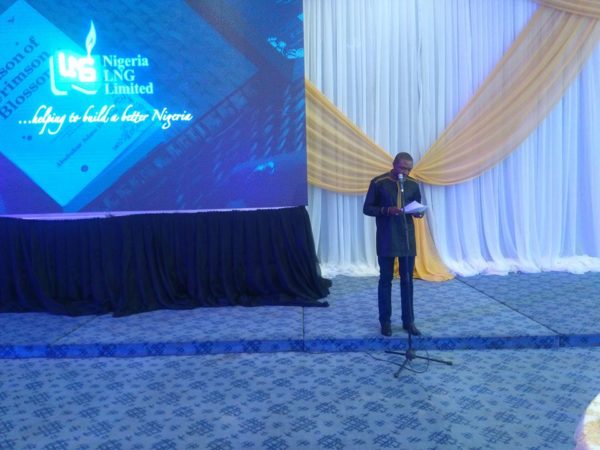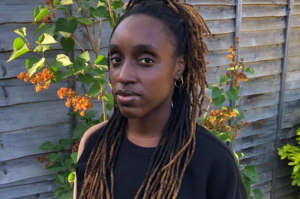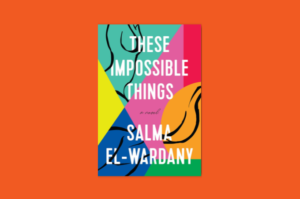…that despite the wars, the violence, the immeasurable harm we perpetrated, our resilience and strength and our humanity still shone through the dark mist.
A FEW WEEKS ago, Abubakar Adam Ibrahim was awarded the 2016 Nigeria NLNG Prize for Literature, for his first novel and second book of fiction, Season of Crimson Blossoms (2015). At $100,000, it is the richest literary award in Africa, even though only Nigerians are eligible. Alongside him on the shortlist were the winner of the 2012 Prize, Chika Unigwe, for Night Dancer (2012), and Elnathan John, for Born on a Tuesday (2015).
Abubakar’s win is symbolic on several levels. He, alongside Elnathan, represent the rise of Northern Nigerian writing. And then he was born in Jos, a city that, some days before his win, saw its university library burn. His acceptance speech, presented at the award ceremony on November 28, does not neglect his origins: it is rousing and full of heart and political and beautiful. It is a rallying call.
Congratulations to Abubakar!
***
*Dreams and Other Dangerous Pursuits
By Abubakar Adam Ibrahim
The other day I got a message from a young woman in Calabar. She was struggling to come to terms with the idea of being a writer and her father was accusing her of using writing as a “vengeance mechanism”. Searching for answers and directions, she reached out to me.
Her message and her struggles took me back to when I was a skinny boy in Jos growing into writing, evolving from phase to phase the same way I grew from one set of clothes into another. It was natural, this business of writing, as natural as growing was. It was something I not only wanted to do, but had to do.
Mum fancied I would be a doctor. Although somewhere in the deep recess of her beautiful heart, she was open to the idea of me being a footballer. My father, God rest his soul, might have grumbled something about me being a surgeon. I was, I think, a decent science student. I was a decent footballer, never destined to be a great one. And my attempts at being an artisan only provided temporary occupation, not any great joy. I was certain a career in medical practice would have been the same. The only thing that came naturally to me, almost as natural as breathing, was writing.
In the times when reality hit hard, as reality often does, I retreated to the safety of my imagination, and into daydreams that gave me the magical powers to deconstruct life and reality and rebuild it one word after another. This is what writers do and this is what literature is all about, not only to report reality, as the newspapers do, but to dissect it, explore it and document the human condition.
As a boy I wrote because, in my puerile mind, I wanted to immortalise myself, not in literature but through literature. However, as I grew, and my consciousness evolved, I realised that it wasn’t just about me, but about us as a people, as humans. I realised that literature, as an art form, can be used for individual gratification, but at the same time, it lends itself to a far greater cause, that of our collective humanity. It became clear that what I really wanted to do was to immortalise us, so that when the future excavates us, it will see, beyond the newspaper headlines that reflect the damage we inflict on ourselves and one another, that we lived and loved, that we dreamed and aspired and failed, that we rose and continued, that despite the wars, the violence, the immeasurable harm we perpetrated, our resilience and strength and our humanity still shone through the dark mist.
Literature is a reservoir of memories. It reminds us of what places like Jos were like before the violence started in 2001, that this violence happened because someone got away with the atrocities that were committed in Zangon Kataf, that Zangon Kataf happened because some people got away with the atrocities that were committed during the civil war. It reminds us that unless and until our notion of social justice is reformed and perfected, Jos and Zangon Kataf and maybe even Biafra could happen again, that our individual and collective acts of barbarity, perpetrated daily, have consequences beyond the obscure figures that are sometimes reported in the newspapers. That with every single life lost to our intransigence, a thousand dreams and promises are extinguished.
But literature is not only about the past or the remains of us that may or may not be uncovered. It is also, and perhaps most importantly, about the here and now. The present that we live in, this present that we desperately seek to destroy through random acts of callousness or brutality. Literature is the prompt for introspection we need to subject ourselves to, the need for us to pause and take stock of the consequences of our thoughts, utterances, actions and our perceptions of each other. Literature must not necessarily proffer solutions but should offer an opportunity for deeper reflections on what it means to be human, irrespective of our faiths, our genders, our tribes, our political affiliations or our race.
Literature is a mechanism that allows us to capture our imaginations and thoughts and to project them, in the highest artistic form, to the present as well as the future.
In 1865, French writer Jules Verne imagined what would happen if someone fired a giant bullet, containing humans, to the moon and wrote about it. It was crude and wonderful and thoroughly entertaining but it also planted a seed in the heart of a future, which now has become past. The moon landing became a reality half a century ago.
No civilization or people achieve anything without imagination. The dire state of the Nigerian nation is a testament to this fact. We are not only conditioned to abhor imagination and creativity but to stifle it. Our education system, a legacy from our colonial past, which has been slothful in reinventing itself, does not encourage people to unleash the powers of their creativity but instead curtails them. And so we end up producing graduates who have no great desire to change or improve the system, but to pass through it, depend on it, suck the blood out of it and in retirement rely on it, without making any significant input for future generations.
Here dreams are stifled. Here dreams are murdered at dawn and buried in the vast graveyard of disillusionment we live in. My parents knew I was a dreamer. And in the failed middle class family we grew up in, dreaming was a luxury we could scarcely afford. But by incredible acts of faith (and perhaps also because they were preoccupied with the challenges of daily life) my parents never stood in the way of my dreams. Regardless, like all sensible parents, they wanted a backup for me, something that would guarantee that I made some kind of livelihood. I failed as an apprentice electrician and in other artisanal pursuits they recommended for me. But they had faith and made way for the tendrils of my dreams to flourish. And today, I stand here before you, because of that blind faith.
Dreams sometimes come fully formed, neatly packed in dainty boxes with shiny ribbons. But all dreams need to be hacked and chiselled and beaten into shape through years of hard work and diligence. Some dreams chase you. Other dreams you chase and you chase them hard. You stumble and fall, but because you believe, you rise, you make sacrifices and you hunt them down until you get them. When dreams escape you, as they sometimes do, it shouldn’t be for a lack of effort.
And here, it becomes necessary to put forward the need for a reform of our education system so that it is no longer the hand that strangulates dreams, imagination and creativity but one that nurtures it, one that encourages people to pursue other non-conventional career choices and the endeavours that make them happy, that makes them think, rather than producing zombies mindlessly tugging at the failed machinery of state.
So I ask the parents of the girl in Calabar who dreams of writing, or the young boy in Kano who aspires to conquer the present and the future with the power of words: Would you rather smother dreams and ambitions in your children or would you let them spread their wings and fly to pursue the things that give them fulfilment?
One thing that is certain is that all dreams, grand or modest, need believers. And for all those who have ever believed in me, in the rangy dreamer who prowled the streets of Jos, in the writer who grew from that boy, from my family, friends, colleagues, to my amazing publishers (who are even bigger dreamers than me), all of those who invested their time and resources and above all their faith, in what I do, who made sacrifices and whispered or shouted encouragement, this day, I celebrate you all and say thank you.
It is certainly a great privilege to have been so honoured with this prize, for which I am truly grateful. But the greatest triumph today is the light of belief I have seen kindled in the floundering hearts of those who previously thought there was a glass ceiling over their heads because of their background, because of the sounds of their names or what part of the world they come from. If you believe, the only thing stopping you from accomplishing your goals is you and no one else. This world, the present and the future will always be defined by those who have the courage to dream and to pursue those dreams.
Thank you.
The title of Abubakar’s speech is an adaptation of the title of Laila Lalami’s 2005 collection of short stories Hope and Other Dangerous Pursuits.
*********
Facebook link image by Amara Nicole Okolo via Facebook.
Image in the post is by Richard Ali via Facebook.










BOOKS: ROOTS BEFORE BRANCHES – Don't Date A Writer December 22, 2016 04:11
[…] grown on me (author of Season of Crimson Blossoms) said in his speech, <a href = “https:// http://brittlepaper.com/2016/11/wanted-immortalise-abubakar-adam-ibrahims-nlng-prize-acceptance-spee…; > Dreams and Other Dangerous Pursuits </a>, “I realised that literature, as an art […]